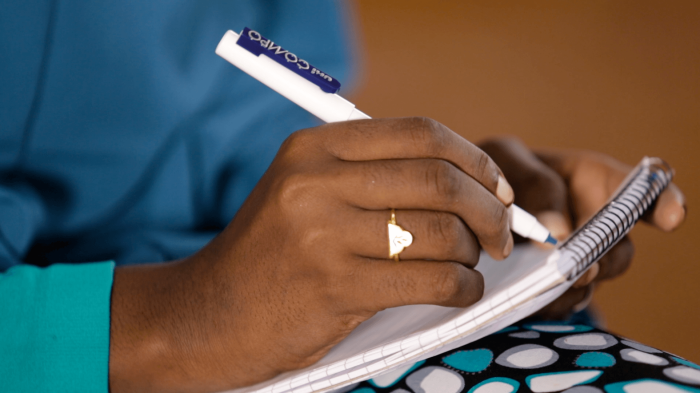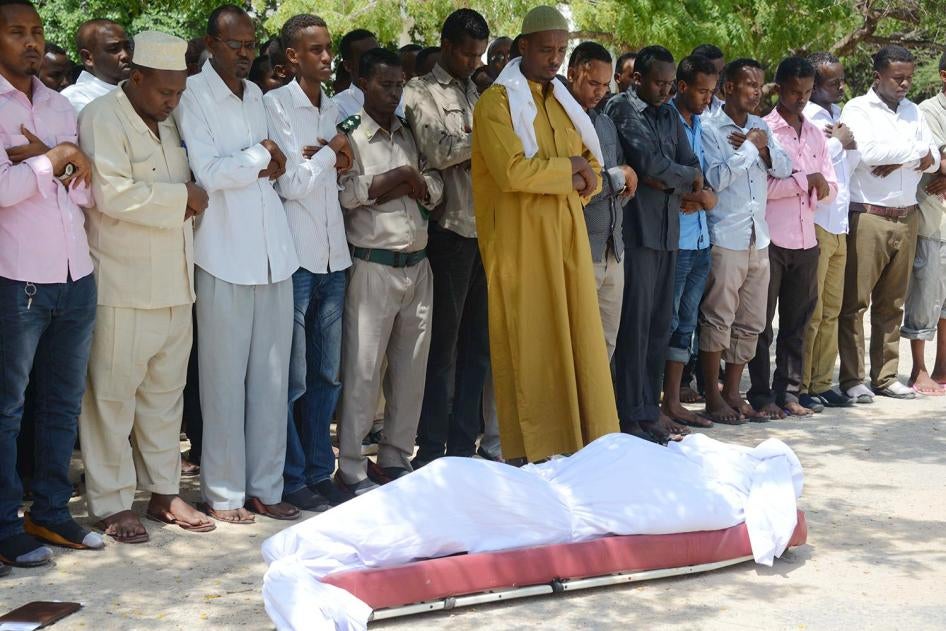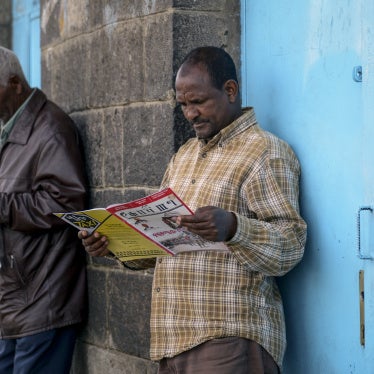(Nairobi) – Both the Somali government and the Islamist armed group Al-Shabab are using abusive tactics to sway media coverage, Human Rights Watch said in a report released today, on World Press Freedom Day. The government should act decisively to end intimidation and violence against journalists by state security forces and Al-Shabab militants. Somalis’ need for a free and vibrant media is especially important in light of the electoral process planned for 2016.
The 74-page report, “‘Like Fish in Poisonous Waters’: Attacks on Media Freedom in Somalia,” documents killings, threats, and arbitrary detention of journalists since 2014. The Somali federal government and regional authorities have used various abusive tactics to affect media coverage, including arrests and forced closures of media outlets, threats, and occasionally, criminal charges. Al-Shabab has targeted journalists as part of its campaign against the Somali government and for reporting deemed unfavorable. Government authorities have failed to adequately investigate and prosecute those responsible for abuses, leaving journalists to live in fear.
“Media freedom shouldn’t be yet another fatality in Somalia,” said Laetitia Bader, Africa researcher at Human Rights Watch. “On top of the long-term threats from Al-Shabab, the new government is increasing the danger and repression for journalists at the very time when their services are most needed.”
Both Al-Shabab and the Somali government and its allies have sought to exploit the vulnerabilities of the largely unpaid and inexperienced journalists throughout the country’s long conflict, Human Rights Watch found. Each side has pressured journalists about their reporting, manipulated casualty figures, and obstructed reporting, greatly affecting the media environment. Dozens of journalists have fled into exile over the last decade.
While Al-Shabab has posed the main threat to the media, journalists have come under attack from a range of state and non-state actors. A journalist in Galkayo, Puntland, said: “The authorities, the public, and the militants are all hostile to us. We are like fish in poisonous waters, we can be attacked or killed at any time.”
Human Rights Watch interviewed 50 journalists, editors, and media directors working across south-central Somalia and Puntland. Since 2014, 10 journalists have been killed – four in apparent targeted attacks – and six journalists have survived assassination attempts. Others have been injured while reporting. Dozens have been arbitrarily detained, a handful prosecuted, and scores have received threatening phone calls and text messages warning them to change their reporting or face consequences.
One journalist who survived an attack in Mogadishu in October 2014, had no doubt he was the target: “I could hear several voices telling the shooter to aim better. I could hear them saying, ‘He is still alive!’” He was wounded so seriously that he can no longer work as a reporter.
In Mogadishu, security officials have banned reporting about specific issues, such as statements by Al-Shabab, and temporarily closed down at least three media outlets and arrested journalists that don’t comply with these orders. Regional authorities in contested towns resorted to arbitrary arrests and threats, and closed down five media outlets to control political coverage.
Government officials have regularly sought to justify restrictions on media freedom by claiming that the media are acting unprofessionally or on national security grounds. Notwithstanding the difficult security and political context, the authorities have tried to curtail legitimate news coverage using tactics that often place journalists at risk of reprisals, Human Rights Watch found.
Al-Shabab unlawfully treats journalists, who are civilians under the laws of war, as extensions of the Somali government or foreign military forces. The group has used threats and violence against journalists to coerce positive coverage.
Female journalists face additional problems. They contend with social and cultural restrictions, discrimination by their peers, and targeted threats from Al-Shabab, who seek to curtail women’s participation in public affairs.
Somali journalists say they often respond to threats, intimidation, and violence with self-censorship. Many steer clear of reporting on sensitive issues – including security, corruption, and political processes particularly linked to federalism.
“Now we face a very dangerous group that wants to interpret every single word in the media, Al-Shabab, and authorities that also want to oppress us instead of protecting us,” said a journalist in Galkayo. “Self-censorship is my only remaining option and that is very sad.”
Hopes that new authorities in Mogadishu, Puntland, and the newly-created interim regional administrations would bring justice for abuses against journalists have been dashed, Human Rights Watch said. The federal government has only investigated and prosecuted attacks on journalists attributed to Al-Shabab, relying on the national intelligence agency, which has no law enforcement mandate, and the country’s military court, whose trials do not meet international due process standards. Three people were sentenced to death and executed in April 2016 for their alleged involvement in killing six journalists. Human Rights Watch identified due process violations during the recent trials that undermined the defendants’ rights to a fair trial. No government official is known to have been prosecuted or disciplined for attacks, threats, mistreatment, and unlawful detention against journalists.
The problematic trials and one-sided investigations, which leave survivors subject to reprisals, foster an enduring fear among journalists. Many told Human Rights Watch they saw no point in even reporting incidents to the police since they would not pursue the attackers and going to the police puts the victims at further risk.
In January 2016, President Hassan Sheikh signed off on a new media law that risks further hampering freedom of expression, Human Rights Watch said. While the law has some positive aspects, it includes many vague restrictions on the media. The new law is likely to prompt further self-censorship as journalists are unable to determine what conduct is criminalized.
Somalia’s government leaders should unequivocally condemn attacks against journalists and media workers and carry out prompt, transparent, and impartial investigations, Human Rights Watch said. They should commit to full, open reporting on issues of pressing public interest and amend or revoke laws that restrict the right to freedom of expression and the media. International donors should press the Somali government to protect journalists from abuse, review relevant laws, and provide technical assistance to ensure rights-respecting criminal investigations.
“Promises to improve media freedoms are a positive step but not enough,” Bader said. “Somalia’s authorities need to actively address violence and intimidation from all sides so that journalists can go to work without constantly looking over their shoulder.”











